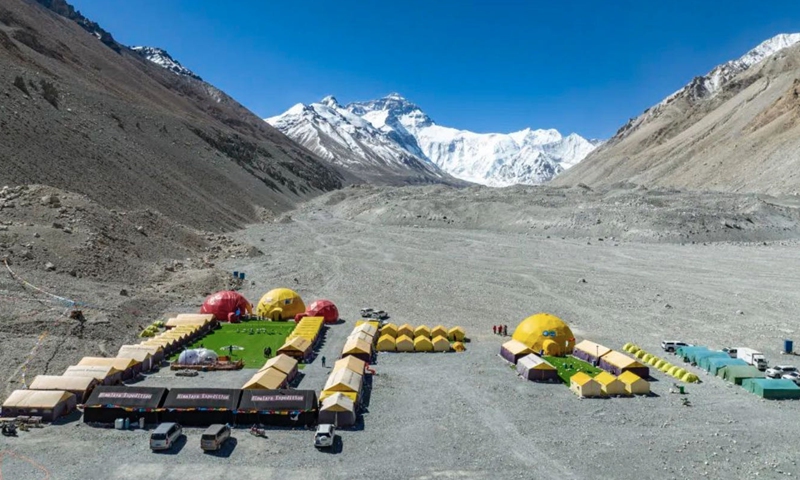
Chinese scientific research teams have started a scientific expedition to the Mount Qomolangma region (commonly known as Mount Everest in the West) in Southwest China's Xizang Autonomous Region, the Second Comprehensive Scientific Expedition to the Qinghai-Tibet Plateau confirmed on Monday. Photo: Xinhua
Chinese scientific research teams have started a scientific expedition to the Mount Qomolangma region (commonly known as Mount Everest in the West) in Southwest China's Xizang Autonomous Region, the Second Comprehensive Scientific Expedition to the Qinghai-Tibet Plateau confirmed on Monday.
A total of 170 scientists are conducting research on water, ecology and human activities, aiming to reveal the mechanism of environmental change and optimize the ecological security barrier system on the plateau.
Dubbed "the roof of the world" and "water tower of Asia," the Qinghai-Tibet Plateau is an important ecological security barrier in China. It is also a natural laboratory for conducting research on the evolution of the Earth and life, and the relationship between man and Earth.
According to the law on ecological conservation on the Qinghai-Tibet Plateau, the state encourages and supports scientific investigation and research on the plateau, and promotes long-term research to understand the ecological background of the plateau and its changes.
As an important part of the Second Comprehensive Scientific Expedition to the Qinghai-Tibet Plateau, which was initiated in 2017, the ongoing expedition is of great significance in studying the impact of climate and environmental change in the Mt. Qomolangma region on other parts of the world.
The 2023 Qomolangma expedition will continue to focus on major scientific issues such as how the extremely high altitude environment of Mt. Qomolangma changes under the influence of global warming, how the environment change of Mt. Qomolangma interacts with the westerly winds and monsoons, and how the environment of Mt. Qomolangma will affect the changes of the "water tower of Asia," according to Yao Tandong, an academician at the Chinese Academy of Sciences and team leader of the Second Comprehensive Scientific Expedition to the Qinghai-Tibet Plateau.
"The Qomolangma expedition has realized the transformation from 'I want to conquer you' to 'I want to understand you,' and has achieved the application of new technologies and resulted in important international influence," he said.
A series of scientific achievements have been made so far, including discoveries related to the influence of westerly winds and monsoons, the physiological response of the human body in the Mt. Qomolangma region, and the ecological process of the greening of the Mt. Qomolangma region.

